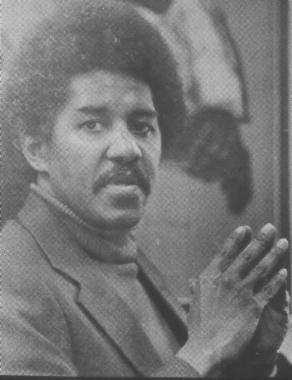Bobby Eugene Wright, Pan-African clinical psychologist, mental health administrator, and theorist, was born March 1, 1934 in Anniston, Alabama. Reared in Hobson City, Alabama’s first all-Black town, by mother Myrtle M. Johnson, stepmother Zellar C. Royle, and father, Bennie Henry Wright (1904-1949), a Monsanto Chemical Company laborer. He was the fifth of six siblings, Albert, Bennie, John, Nellie, and Levi.
Wright served in the US Army from 1951 to 1954 and then moved to Chicago, Illinois where in 1959 he married Easter M. Overton, a Hyde Park Career Academy High School mathematics teacher. They had one son, Marcus Delaney. Wright completed the B.S. in Education at Chicago State University in 1966 and an M.A. in Counseling & Guidance two years later. He earned a 1972 University of Chicago Clinical Psychology Ph.D.
A truant officer for Chicago Public Schools in the 1960s, Wright was a member of the Association of Afro-American Educators and the Chicago Teachers Union. In 1968 he organized the Black Teachers Caucus, which successfully challenged the Board of Education’s racist hiring practices. Wright taught “The Psychology of Black Nationalism” at CommUniversity, a weekend Pan-African Studies program at the Center for Inner City Studies at Northeastern Illinois University that he helped establish in 1968 with “The Chicago Group” consisting of Jamala Rogers, Jorja Palmer, Iva and Jacob Carruthers, Conrad Worrill, Anderson Thompson, F.H. Hammurabi Robb, Hannibal Afrik, Harold Pates, Harold Rogers, and members of Chicago’s Black Student Movement. Wright’s most prominent students included Fred Hampton, Larry Obadele Williams, and Kobi K.K. Kambon. CommUniversity was instrumental in establishing important adolescent rites of passage, the Confederation of Pan-African Organizations, Institute of Positive Education, Kemetic Institute, Black Peoples Topographical Research Center, and African Liberation Day.
Wright emphasized the need for Africans to define themselves; cultivate institutions, and social theories to change the politics and policies of mental health. He called on Africans in America to recognize the psychology of racial warfare and to create independent frameworks to oppose the European worldview. He coined the phrase “Mentacide” to describe the deliberate and systematic destruction of the African mind, and his ideas helped develop protocols for a culturally sensitive and relevant treatment of Black mental health. His popular The Psychopathic Racial Personality and other Essays (1974) advanced the Wright Social-Political Model which assessed Black suicide and asserts the controversial view that whites are psychopaths, “constantly in conflict with other persons or groups…unable to experience guilt…completely selfish and callous,” have “a total disregard for the rights of others,” and thus should not teach Black children.
As part of the Task Force for Black Political Empowerment, Wright, Alvin Boutte, Edward Gardner, Jacoby Dickens, and Albert “Cadillac” Johnson helped Congressman Harold Washington begin his campaign to become Chicago’s first Black mayor in 1983. Fond of saying “A Luta Continua Lasima Tushinde Mbilishaka” (The Struggle will Continue and We Shall Conquer without a Doubt), Wright died on April 6, 1982 at the age of 48. At the time, he was Association of Black Psychologists president-elect and director of the Garfield Park Community Mental Health Center (1973-1982), which was renamed in his honor.

